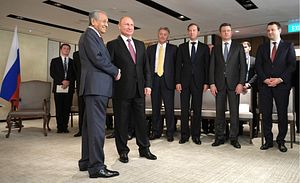Last week, a high-level Russian delegation was in Malaysia for defense-related consultations between the two sides. The scheduled engagement, which came just ahead of Malaysian Prime Minister Mahathir Mohamad’s visit to Russia this week, spotlighted continuing efforts to advance the defense aspect of the relationship in spite of the challenges that remain.
Though Malaysia and Russia have had an official diplomatic relationship going back decades, the momentum for relations was only truly boosted in the late 1990s and early 2000s, which was towards the end of Mahathir’s first tenure as prime minister. And while there was an uptick in security ties during that time, including exploring Malaysia’s purchase of Russian jets, relations thereafter had not kept up the momentum since then and endured their fair share of strains, with a case in point being the downing of Malaysian flight MH17 in Ukraine back in 2014.
Given all this, it is no surprise that we have seen an increased focus on Russia-Malaysia collaboration since Mahathir came to office last May, including on the defense side, despite the obstacles that remain. For instance, last November, when Mahathir and Putin held their summit meeting, the two sides discussed ways to advance ties, with Mahathir directly noting that Malaysia still had “to learn more about how to repair and maintain Russian” aircraft, a point echoed by Malaysia’s defense minister Mohamad Sabu when he publicly disclosed in July 2018 that only four of the 28 aircraft owned by Malaysia could actually take to the skies.
That has continued on into 2019 as well. Indeed, this week, Mahathir is in Russia for a trip at the invitation of Putin, where the Malaysian delegation will attend the Eastern Economic Forum (EEF) for the first time and both sides will attempt to advance ties in several areas including military-technical collaboration.
Last week, the defense aspect of the relationship was in the headlines again with a security-related meeting. Malaysia and Russia held the defense consultations in Malaysia in line with the visit of a high-ranking delegation from Russia, which came right before Mahathir’s own trip to Russia.
Per a statement by Malaysia’s defense ministry, Malaysia and Russia held a meeting between the two countries that was chaired by Malaysia’s Defense Minister Mohamad Sabu and the visiting Secretary of the National Security Council, Nikolai P. Patrushev, who was on a two-day official trip to Malaysia. The composition of the Malaysian delegation saw the inclusion of various actors, including the military, police, and coast guard, as well as the home, foreign affairs, and transport ministries.
According to the statement, during the meeting, the two sides discussed the state of their defense ties as well as security issues of common interest. These included, among others, drug trafficking, cybersecurity, organized crime, and terrorism and violent extremism. They also discussed potential avenues for strengthening relations as well, which included defense industry cooperation through various means including smart partnership, joint ventures, and strategic business alliances between defense firms on both sides.
Unsurprisingly, few additional specifics were publicly disclosed about the private deliberations between the two countries. But reflecting on the significance of the defense consultations, Victor Kladov, a special aide to Putin and international cooperation and regional policy director at Rostec State Corporation, told the New Straits Times at the MAKS 2019 aviation and space show at the Zhukovsky International Airport in Moscow that Patrushev’s meeting reflected Russia’s commitment to advancing ties with Malaysia. He also specifically noted items of interest within Russia-Malaysia defense cooperation, including dealing with maintenance issues of previous Russian aircraft sold to Malaysia, selling new equipment including jets and helicopters, and helping Malaysia develop industries, including its aerospace industry.
To be sure, it remains unclear how much of this will translate into reality. Nonetheless, as we see continued engagements in Malaysia-Russia relations including Mahathir’s visit this week, it will be interesting to watch how the defense aspect of the relationship evolves over time.
































